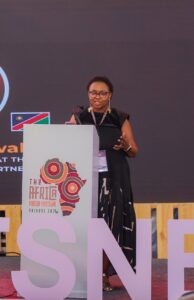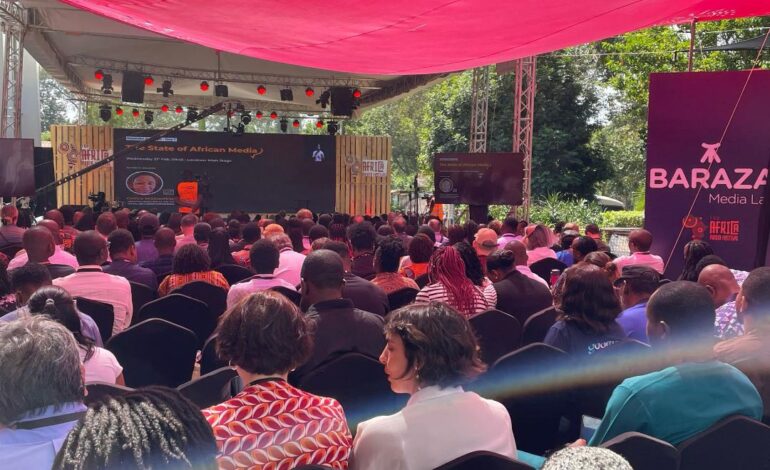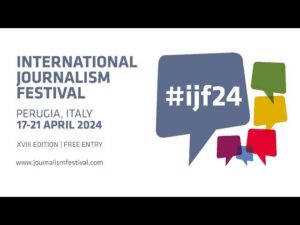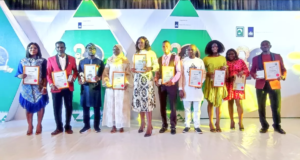Media practitioners and innovators from the different sectors and genres of the media ecosystem this week gathered in the Nairobi National Museum Kenya for the Africa Media Festival 2024.
Hosting diverse media professionals from journalists to podcasters and content creators, to researchers, publishers and media product builders, Baraza Media Lab’s second edition of the festival seeks to answer the question What is Next in Media? About 70 speakers from across 18 countries are engaging the participants in conversations, workshops, and demos of media products and innovations in Africa
In this piece, our Correspondent, Aderoju Noah monitoring the proceedings online shares key takeaways from the two-day festival’s key-note addresses and demos which adequately answer the theme question of the festival.
Opening the discussion on the first day of the festival with the keynote address on the “State of African Media” Onica Makwakwa, the Executive Director of Global Digital Inclusion Partnership stressed the need for Africa to take control and be the pilot of their rise to global relevance, stop adopting the Western gaze in their innovations and decolonise innovations in African technologies.
Makwakwa painted the current picture of the African digital space which is the ground for all media and innovations in which 60% of Africans and 59% of African youths are offline mainly due to the unaffordability of device and data packages and even unavailability in some places.
Africa accounts for nearly a billion out of the 2.6 billion unconnected population globally leaving millions behind and missing on the digital innovations happening in the continent.
According to her, the unaffordability of the average smartphone which currently costs about 41% of an average household’s monthly income and quality data which takes between 40% to 60% of monthly income is responsible for the digital divide in the continent. Africa, she said needs to raise the bar for meaningful connectivity, demanding more from the providers to create a levelled competing ground for African youths against their counterparts in other continents.

The former head of Africa Alliance for Affordable Internet noted that the highly proliferated night data package which is the worst quality data package has made many youth sleep deprived, further depriving them of fair competition with their counterparts.
She also noted the unchanging rural, gender and coverage gap and the new emerging usage gap entrenching the trends of the digital divide in the continent.
Explaining the usage gap to be the percentage of people who live within broadband connection but are not using it as opposed to the coverage gap where people do not have access to a broadband connection, she emphasised that affordability of data and devices and the lack of digital skill is responsible for this.
To solve these inherent problems and emerging ones, Makwakwa charged the African government to ensure local assembly of smart devices and reduce taxation to boost affordability and make sure these smart devices are so affordable that they are the entry device for any African seeking connection.
She also advised participants of the media festival to take advantage of the content economy by making more localized, indigenous and inclusive content to remedy the highly biased online content of which 65% is English which not so many African countries speak.
After the ignite talks, breakout sessions, networking breaks, workshops and other lined-up programs for the first day, continuing the festival on the second day was the keynote address from the Dutch Ambassador in Kenya, His Excellency Maarten Brouwer and the demonstrations of media innovations.
Maarten Brouwer acknowledged the ever-important role the media plays in democracy as an independent source of factual information, a watchdog and a facilitator of public discourse and debate to foster public engagement and build social cohesion.
Alluding to the fact that about 65 national elections in 54 countries will be held in 2024 and the impact this will have on more than half of the world’s population, he noted that the importance of media and journalism cannot be overestimated.
Brouwer said the integrity of democracies relies upon the free flow of information and ideas which the media facilitates and the ability of media practitioners and journalists to be able to do their work independently and in safety is very important.
Referencing the realities of threats to the lives of journalists and freedom of expression in many countries across the globe, the strong political on media and the scant resources available to journalists, he said the media can’t do their work easily.
He however urged media practitioners to make good professional choices to ensure the integrity of the information they disseminate as the media itself is not free of fault as the realities of mis and disinformation abound.
Aiming to plot the next trajectory of the African media media innovators from various countries in the continent demonstrate their newest innovations and products.
From Nigeria, Wale Lawal, Founder and Editor-In-Chief of The Republic spoke about the publication journey from being a student publication to becoming an evolved Africa-centric publication with unique content delivery serving a subscription-based audience and leveraging on a viable business model to scale.
Joshua Olufemi, the media innovation and data for development entrepreneur and founder of Dataphyte also explained how their product GoLoka can help journalists, newsrooms businesses and stakeholders get access to credible local data through crowdsourcing on the platform and active citizens can earn by helping to get the local information on-site.
Patricia Andago A researcher and Data Journalist from Odipo Dev Kenya demonstrated how the organization used Data journalism and research for the Silencing Women project that help in the production of extensive information, facilitated education and mobilised action for Femicide in Kenya.
Simon Ng’ang’a of Senses Hub Kenya spoke about their work making assistive technologies accessible to people with disabilities in Africa.
Zenzele Ndebele, journalist and founder of center for Innovation and Technology in Zimbabwe stated that the AI news presenter Alice aimed at speeding production of content in the newsroom with less people and resources.
Head Radio 47 and podcast trainer with DW Akademie, Irene Mbaya also displayed the DW’s Podcast MethodKit, a kit to guide podcasters and intending podcasters through the process of developing, producing and publishing a podcast with adequate attention to areas like legal consideration and monetization.
Sebastian Davies Ngida and Dan Aceda talked about the Creator platform and Semabox solving the problem of production, publishing, community and monetization for content creators.
Google News Initiative’s Pinpoint and the newest addition of generative AI was also demoed by GNI Teaching Fellow Ken Kiunga.





